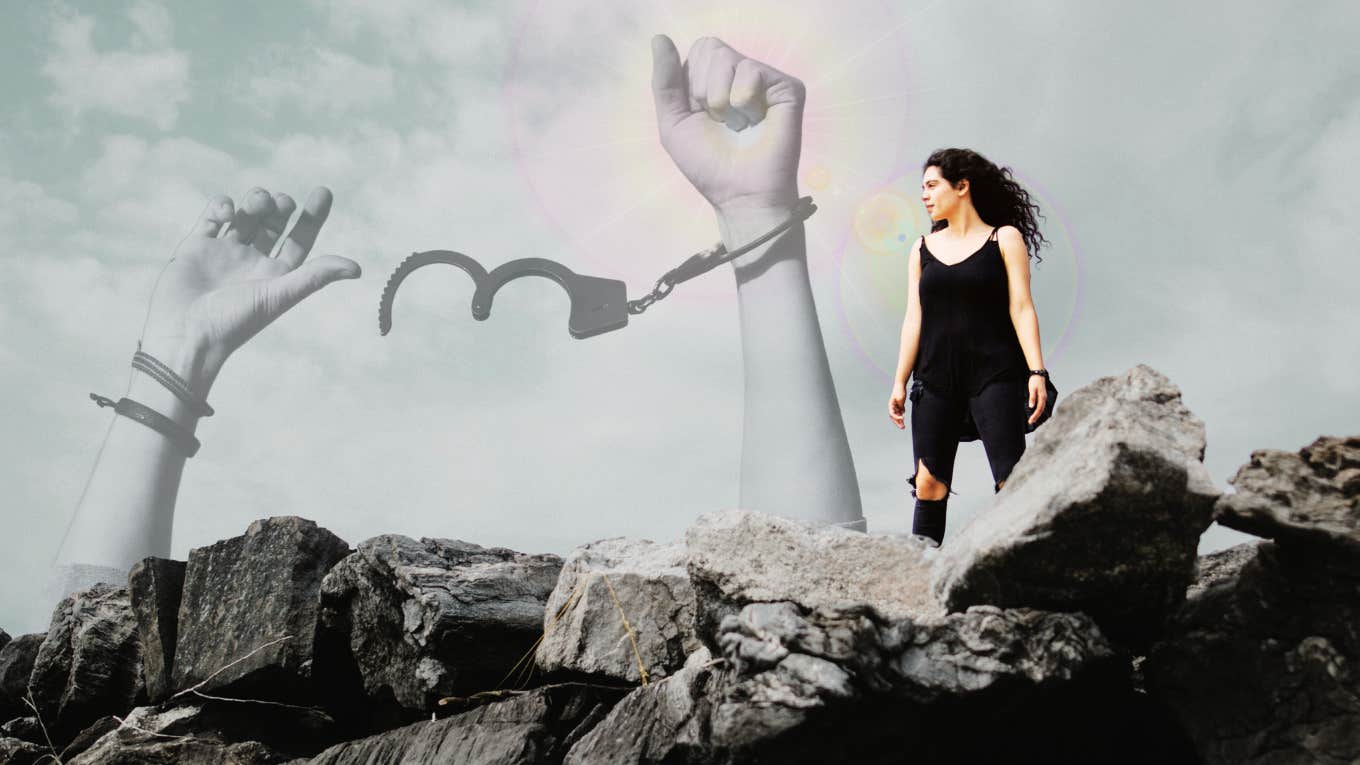11 Non-Traditional (But Effective) Tools To Overcome Your Addiction
The 12 steps don't work for everyone.
 lechenie narkomanii | Canva, Julian Santa Ana | Unsplash
lechenie narkomanii | Canva, Julian Santa Ana | Unsplash Addiction treatment today has a one-size-fits-all mentality. Insurance companies will only reimburse those institutions that follow the 12-step model of Alcoholics Anonymous. If you've known anyone who has gone to a substance abuse treatment facility, you've probably heard the gripe that they're forced to partake in the 12-step model of recovery.
This means joining AA or NA, which, for some, just isn't a good fit. In many cases, they're told this is the only way to truly recover. But this narrow approach has failed many — forcing an addict to do anything is a recipe for disaster. Instead, educate the individual and let them decide what they need to do. As someone who's worked in inpatient and outpatient drug treatment settings, I believe there are other ways to recover from addiction.
Here are 11 effective non-traditional tools you can use to overcome your addiction:
1. The desire to change.
No matter what program or situation you put yourself in, if you don’t want to change, you won't. I've seen many clients — in both residential and outpatient settings — who were going through the motions. Addicts are good at manipulating people, so they continue to act this way in treatment.
I tell my clients, “When you feel you're getting one over on someone, the person you're fooling and hurting is yourself.”
Ask yourself, Do I want to change? (This question requires soul searching.) If not, maybe you aren’t ready. You won't get better unless you want to.
RELATED: Yes, You Can Learn To Embrace Change — But Why Not Learn To Love It?
2. The willingness to do the work.
Recovering from any addiction takes a lot of work. I've had many clients tell me that the statistics are against them. I would use this analogy to get my clients to stop worrying about the recovery odds and to start looking inward. If we have 100 people at the treatment center, 50 percent probably don’t want to change. Out of the remaining 50 percent, probably 25 percent or less are willing to do the work. These are the individuals that will recover.
How hard am I willing to work? What does it mean to do the work?
3. A regimented daily schedule.
Individuals who succeed in recovery have a daily routine they follow rigorously. They know what their day will look like from the time they wake up until their head hits the pillow at night. These individuals implement activities that are going to keep them sober.
4. A sober support system.
One of the most beneficial things about 12-step programs is that they provide support. If you're going to recover without these programs, you'll need to find positive sober support systems. You'll also need activities that involve other like-minded individuals. Spiritual activities or activities where using substances is not encouraged are a great start. Hiking, scuba diving, yoga, and gaming are all possibilities. If you're open and honest with your new friends, they should respect your decision to stay substance-free.

Photo: oneinchpunch | Shutterstock
5. The resolution of past trauma.
Many people who become dependent on drugs and alcohol have trauma in their past. Drugs and alcohol are maladaptive coping skills that numb the pain. Without reprocessing these traumas and putting them in a better place, it's difficult to recover.
Individuals tend to have hardwired beliefs about themselves, which are often related to trauma. Individuals need to challenge these beliefs and create new ones that serve them. Pursuing individual or group therapy with a trauma specialist is paramount.
6. The identification of emotions that promote maladaptive coping.
Once the drugs and alcohol are away from the individual, the emotions that drove them to use drugs will resurface. It's common that anger, sadness, discontentment, and fear (along with a plethora of other emotions), are the source that drives the using.
Work with a therapist to understand and control these emotions. A well-trained therapist will give you concrete exercises that, over time, can teach you to regulate thoughts and emotions. Mindfulness is your friend.
7. Healthy spiritual practice
Often, people who have an unhealthy relationship with substances have lost their spirituality. They feel that the universe is working against them, and this attitude becomes a self-fulfilling prophecy. It's helpful to connect with the universe and feel its support for you to heal. Spirituality means different things to different people — the important thing is feeling connected to the source.
8. Persistence after failure.
One of the problems I have with the 12-step program is the counting of days. If you relapse, you must start over from the beginning, even if you've been sober for years. Many substance abuse clients have long-standing issues with shame and guilt.
They feel too ashamed to get back up, so they continue on a downward spiral. Many people feel comfortable in this space. I use the analogy of getting a flat tire. When you get a flat tire, do you pop the other three? Or do you put on a spare and get back on the road? People with a history of trauma or abuse have a harder time getting back up.
Certain people need nurturing, while others need tough love. One size does not fit all.
9. An awareness of the "Victim Martyr Paradigm".
Notice if you tend to complain, shame, or blame others for your problems. On the flip side, notice if you try to carry the world on your shoulders. We can only control our thoughts and feelings, so why not take our power back? Take responsibility for your thoughts, feelings, and actions. Move forward.
10. Daily affirmations and self-improvement.
It's important to learn and grow as you continue on your path of recovery. Daily affirmations help to introduce positive self-talk into the mind.
Reading self-help literature, practicing meditation, diaphragmatic breathing, or whatever you choose will help you to stay focused and have fewer plateaus. Live by the mantra, "I only need to be better than the person I was yesterday."
11. Holistic healthcare.
Become aware of the mind, body, and spirit connection. Be aware when things are out of sync, and learn to ask for help if you feel unbalanced. Have you started eating emotionally? Do you feel disconnected? That means it’s probably time for a tune-up. Therapists, friends, nutritionists, and spiritual advisors help get back on track.
The point of this article is not to bash the 12-step model of recovery. I've known many people who have used the 12 steps and have had fantastic results. This article is to let people know there are other ways. You can recover! But if you're looking for an easier way, this is not it. Anything that's going to transform you and has value takes hard work.
Brent Berman is a holistic psychotherapist in Jupiter, Florida. He has extensive experience in the field of addiction and believes in changing the world one smile at a time.
